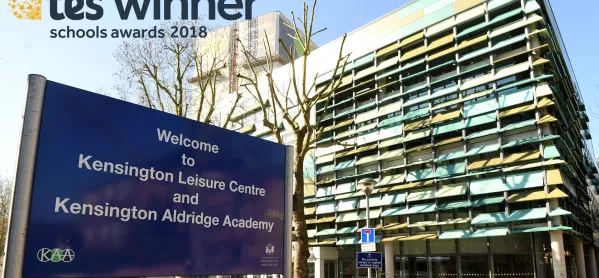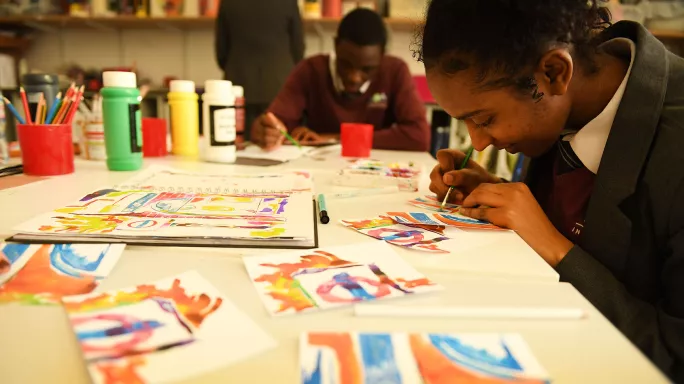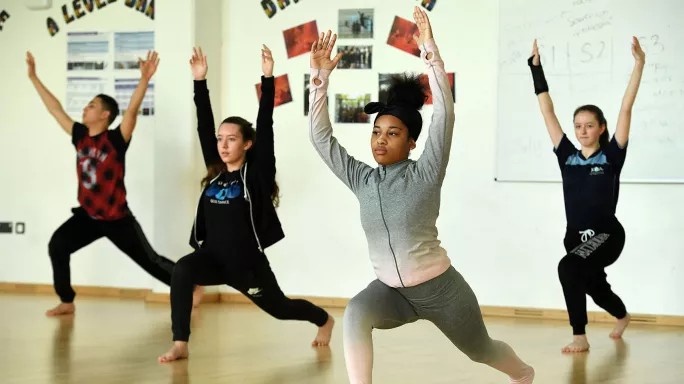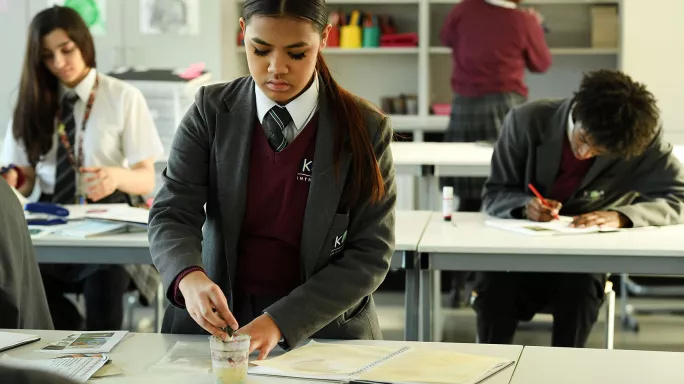- Home
- The school that found ‘clarity’ after the ‘turbulence of Grenfell’
The school that found ‘clarity’ after the ‘turbulence of Grenfell’

Kensington Aldridge Academy has come home.
“People appreciate the building and the facilities more than they ever would have if they hadn’t been displaced for a year,” says headteacher David Benson, taking Tes on a tour of the school on an uncannily sunny February day. “You take things for granted.”
KAA is the school at the base of Grenfell Tower. After the catastrophic fire of 14 June 2017 that claimed the lives of 72 people - including four of its pupils and a fifth who had recently left - the academy was forced to immediately evacuate its site.
For the remainder of that academic year, lessons were relocated to two local schools. When it became clear the secondary would not be able to return for the beginning of the new term, a temporary site - ‘KAA2’ - was erected over the summer holidays. It went up in just nine weeks and was dubbed “the fastest school ever built”.
The academy only returned to its site last September - a feat that posed almost as big a logistical challenge as constructing KAA2. “I do not recommend moving school,” Benson says with a grimace. “Ever. It’s like moving house times a thousand.”
His school’s extraordinary response to the Grenfell fire was recognised with a special Services to Education Award at last year’s Tes Schools Award. It wasn’t the only award it received that night. KAA - rated ‘outstanding’ by Ofsted in all categories - was also named secondary school of the year. (Read Benson’s tips for building an exceptional school here.)
On a visit to the school, Grenfell is literally unignorable. A heart-shaped Grenfell roundel stands in the school’s atrium. The tower looms over the sun-baked playground. It is covered in plastic sheeting now, and bears a banner with a green heart, along with the words: GRENFELL FOREVER IN OUR HEARTS.
The pupils lost classmates in the fire and nearly 60 students were rehoused because of the disaster. It will clearly always be a part of the school. But KAA is looking to the future too. “It’s really about consolidating the success of the school, continuing to look after people in a post-Grenfell environment and continuing that healing process,” says Benson.
 A ‘simple model’
A ‘simple model’

KAA is a young school. It only opened its doors in September 2014, with Benson as the founding principal. A Cambridge-educated former Teach Firster, he learned the ropes as deputy head of another start-up school: Ark Academy in Wembley.
Benson says KAA was always clear what sort of school it wanted to be. It shares DNA with other high-performing London schools, such as Ark Burlington Danes in White City (where Benson used to work) and Mossbourne Community Academy in Hackney. He says the school’s “simple model” is built around “great teaching supported by a strong behaviour policy”.
On the teaching, Benson says KAA offers a “fairly traditional” curriculum based around “discreet academic subjects”, adding: “We do not believe in a generic, cross-curricular, thematic, skills-based approach.”
The building helps. “We’re really lucky because this is a brand-new, purpose-built school, before austerity,” Benson explains, pointing out the large glazed sides to each classroom. “The design of the building really links to teaching and learning and the philosophy of this school.” The glass walls effectively mean that “colleagues can all see each other all of the time”. “You don’t want teachers who think, ‘I’m going to deliver an excellent lesson once a term when I’m being observed’,” he says.
Demonstrating the school’s “open-door policy”, Benson strolls into an English class and starts quizzing pupils on the poem they’re studying. Some teachers might worry about being constantly on show, but not at KAA, insists Benson.
“The good thing about being a new school is that you can articulate your values and your culture from scratch, and then people are recruited into that,” he says. “We’ve always said that it’s an open-door policy and that we actively want colleagues to come into our lessons and observe us and give feedback.”
The head draws a parallel with the NHS. “If you break your arm, the best hospital that you can go to is a teaching hospital, because in a teaching hospital surgeons are observing each other and that’s how best practice is disseminated,” he argues. In that vein, KAA is currently putting together a bid for teaching school status.
While the academy offers a traditional, knowledge-based approach, Benson is keen to emphasise its “co-curriculum”, which he says helps children join up the dots and develop their skills. Each day, about 20 per cent of pupils stay an hour after school to take part in a range of clubs.
“Again, it helps being a start-up because you can say to staff: ‘As part of your contracts, you will all deliver one after-school a week.’” He says no one questions this, whereas you might see “big resistance” in an “established school”.
No silent corridors
KAA’s status as a new school has also helped with the second key pillar of its model: behaviour. Benson explains: “Normally in a secondary school, kids will come in in Year 7. They will have an assembly from the headteacher…the ‘laying down the law’ assembly. The pupils will leave that assembly and they’ll go to the playground, and they’ll meet the existing population of students, and those students will say, ‘Let me give you another take on how the school works.’” He says that in a start-up, that moment where expectations are undermined by an existing population of students (“and possibly teachers”) never occurs.
While KAA might pride itself on its firm discipline, the boisterous passage of students round the school makes clear there’s no “silent corridors” policy. Benson finds the idea objectionable. “What if you want to talk about the lesson you’ve just been to? You are stifling that creativity of debate, you are teaching a level of compliance and a lack of independence, which is totally inappropriate for post-16 education.”
 ‘Intrepidus’
‘Intrepidus’

KAA’s approach to teaching and behaviour has clearly borne fruit. As well as being rated outstanding by Ofsted, the school is in the top 5 per cent nationally for progress from GCSE to A level.
Underpinning everything is its ethos, epitomised by the school’s Latin motto of “Intrepidus”. “I was always really clear that we had to have history, a tradition, customs, and artefacts and ways of doing things,” says Benson. “We had this great phrase when we first opened, about how we need to build 100 years of history in six weeks.”
Benson translates “Intrepidus” as “to be bold or brave or adventurous”, and he says the motto gave the school a “clarity in the turbulence of Grenfell”. “Those values became a lot more important than we’d ever imagined…When you’re in a crisis, you fall back on your values.”
While the school is clearly glad to be home, the transition was challenging for more than logistical reasons. Although parents were “overwhelmingly supportive” of the return, Benson says they understandably had questions about the safety of the site and the “emotional stress” of their children being close to the tower again. Pupils who were particularly worried experienced “gradual re-exposure” to the building over multiple visits. “In the end, not a single child left the school,” Benson says with evident pride. “There were a couple of parents who said, ‘I don’t want my child to go back,’ and they withdrew their kids. They both came back after three weeks.”
Of course, not all trauma is visible, and much of KAA’s support continues quietly behind the scenes. “This school is, [to] all intents and purposes, a normal, upbeat, positive school environment focused on the core business of any school,” says Benson. “But clearly we’ve had to invest in additional staff and additional resource to help students.” The school has an “enhanced therapy and counselling operation”, and close links to NHS mental health services. “The after-effects of Grenfell are still being felt, and we are committed to helping people with adjusting and moving forward with their lives for as long as it takes,” he says.

At the same time, the academy has to deal with all the other challenges with which schools are grappling. Benson acknowledges that London does not face the same recruitment pressures as other parts of the country, but house prices in West London are a particular headache. While KAA serves a deprived community with about two-thirds of its pupils eligible for free school meals, the school is surrounded by some of the most expensive houses in the country.
As a London secondary, KAA unfortunately also has to be mindful of the threat posed by knives. “Any London headteacher who says that they haven’t engaged with knife crime is lying,” Benson says. He thinks heads must “work together” to combat the issue rather than trying to conceal it. “There is a danger that sometimes a head doesn’t want to say, ‘This is our knife-crime strategy’ for fear of their school being labelled as the one that has a problem with knives.” For this reason, KAA operates a joint approach with other schools in the area. Much of it is about encouraging young people to make the right choices. “You don’t put a big knife arch in every school - you educate children about why it’s a terrible idea,” he says.
However, if a child does bring a knife into school, the response is uncompromising: a permanent exclusion. It is a step that Benson has had to take, although he says it is “thankfully very rare”. “Parents should know that schools will take that robust action. There cannot be any ambiguity.”
Delivering a broad curriculum is tough, and funding is clearly a bugbear for Benson. “It would be great if the government could stop squeezing schools now,” he says. “We understand that it had to happen, fine, but let’s start to level it off or reinvest.” He warns that the cuts are now eating into the curriculum and schools’ statutory responsibilities. “This is not about schools wasting money on photocopying - we’ve pared back everything that we can around administrative costs and non-staffing costs.”
‘100 years of history’
Above all, Benson wants to maintain a consistent, excellent education. “It’s a real shame when standards in school yo-yo - it’s difficult for people in the local community”. “We will not be a school that yo-yos around,” he says with absolute conviction.
There might be challenges, but walking around KAA, it’s practically impossible not to be hopeful about the future. The school is not short of friends, either. Prince Charles visited in February, and Gareth Malone worked with the school to put on a homecoming concert, with a programme to be broadcast on the BBC Two this evening (11 March). Benson says it was an “emotional” and “cathartic” concert about “the history and identity of the school”, written by the pupils with the help of Malone.
There’s one last question for Benson before Tes departs. He said he wanted to build 100 years of history in six weeks. But has he given any thought to where KAA will be in 100 years’ time?
“I think this building will be good for 100 years,” he says, laughing.
He thinks for a moment.
“I hope that it will still be outstanding, and that it will still be a lovely place to study and lovely place to work.”
Keep reading for just £1 per month
You've reached your limit of free articles this month. Subscribe for £1 per month for three months and get:
- Unlimited access to all Tes magazine content
- Exclusive subscriber-only stories
- Award-winning email newsletters



